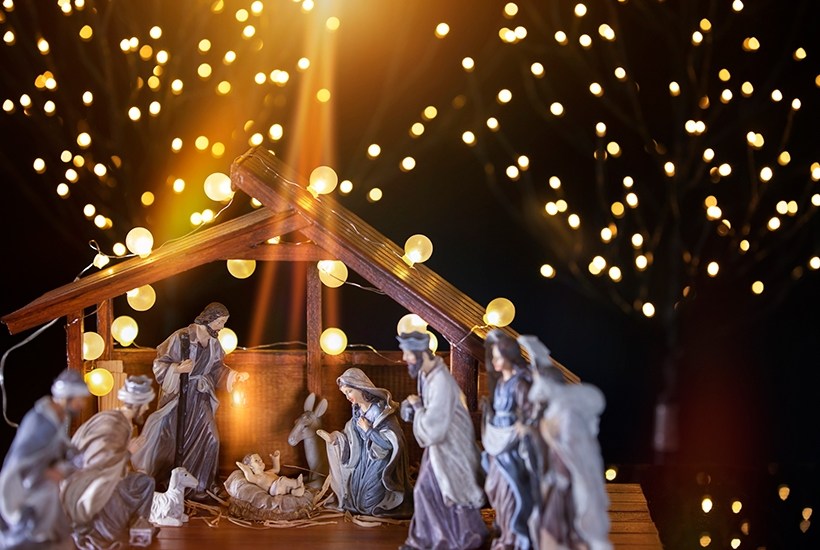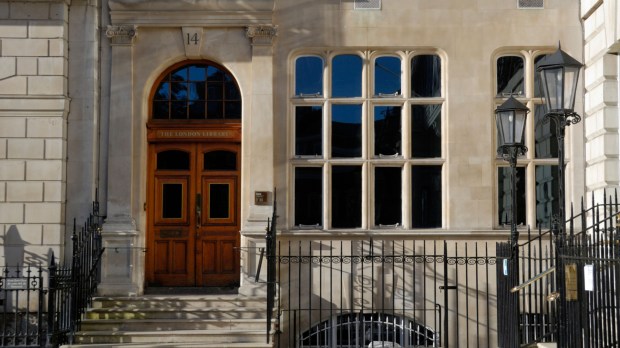Many ingenious ways of evading Covid-19 have been devised to assist commerce, fewer to assist worship. In our next-door village, however, is Darvell, a large, longstanding Bruderhof community, part of a worldwide Anabaptist movement. Always welcoming to neighbours, they normally hold a carol concert in Advent. This year, such a thing is forbidden. Instead, the brotherhood devised a ‘Christmas Drive Through Darvell’. I slightly feared a gigantesque version of the dropsical Father Christmases and reindeer which people stick on their roofs, but I was wrong. At dusk on Saturday, we arrived with three generations of our family. The drive stretches well over a mile before exiting into another lane. It was lined by electric lights, storm-proofed candles, homemade wood sculptures of sheep and deer, and members of the community calling out ‘Merry Christmas’. Motorists were presented with a red box of homemade biscuits and then drove under an illuminated triumphal arch on which lights danced. A series of tableaux began with (yes) Father Christmas, his transport and his ‘workshop’, plus brass band. As we climbed the hill, the scene became more religious. A second illuminated arch was topped by people dressed as angels who sang carols high above us. Real shepherds abided in the fields, warmed by real braziers, tending real sheep and real goats. The actual nativity scene was in a real byre, in a real (pleasingly smelly) farmyard. An inn sign said ‘No rooms’. I could not discern whether a real baby was lying in the manger. Then we encountered the three wise men and a cardboard camel standing beside an enormous (unreal) telescope to search for the star. It was not hard to find, as it beamed bright from the highest treetop. It was such a rich story that the drive took 25 minutes. ‘Goodbye, lights,’ said our excited two-year-old granddaughter as we left, ‘See you soon!’ Two hours later, from the other side of the valley, I could see a long line of pilgrim brake-lights still queueing. I later heard that 600 cars — about 2,000 people — had visited the Darvell marvel that night. It was invented for Covid, but I hope it becomes a tradition that outlasts it.
Another local phenomenon is making me wonder about a post-Covid world. Famously, retail is a victim — but not all retail. Food shops and farm shops have done well. In Battle, our nearest market town, the upper end of the high street is traditionally the tougher to sell in because of traffic. Now, however, it has a series of shops you actually want to visit. As well as the pre-existing, outstanding bookshop, there is a second butcher, a fishmonger, a brand-new greengrocer and wine merchant ditto. There is also a shop selling exclusively British design (how long before someone decides that is racist?), and even a pub reopening soon under new management. Is the rise of these businesses the product of avoiding Covid in a supermarket, of spending power temporarily trapped at home, or of renewed interest in the local? Probably all three. What is certain, however, is that if quality counts for anything, a good number of such businesses will flourish. I hope landlords can see their eventual benefit, and not crush the young businesses with rents that only the likes of Costa can pay.
Have you heard about John Price destroying a stretch of the river Lugg? If not, you have led a sheltered existence. This month, Mr Price, who lives in the Luggside farm he was born in 66 years ago, in Kingsland, Herefordshire, has been attacked by the BBC (who ran denunciations of him unnamed), the Wildlife Trust (‘extreme vandalism’), Monty Don (‘it breaks my heart’), the Daily Mirror etc. He is said to have destroyed habitats by dredging, and by laying waste the bank on one side. Something about the media unanimity aroused my suspicions, so I followed up. Mr Price, clearly a determined man, has spoken out in the Herefordshire Times. He was only doing the job he was asked to do, he says, and is ready to confront his critics from Natural England, the Environment Agency and the Forestry Commission: ‘They don’t know who they’ve taken on here. I’ll pull them apart.’ Trying to understand the local facts, I rang Mrs Carol Sawyers, chairman of Kingsland parish council. Mrs Sawyers was diplomatic — the council is publicly taking no view about Mr Price’s work — but helpful. She pointed out that the Lugg floods much too often. It did so in October 2019 and again last February. An old bridge with three arches crosses the Lugg. Over the years, the undredged river silted up. Fallen trees blocked one arch completely. The Lugg duly flooded, damaging six cottages. One was so badly affected that its residents are still not back in. So the parish council badgered the Environment Agency, which was dragging its feet, to clear the river. Eventually Mr Price, who is responsible for the area, since he owns it, was commissioned to carry out the work. He added some of his own work as well. He ‘knows what needs to be done’, says Mrs Sawyers. As in most such disputes, it is hard to know who is right, but two things can be said with some confidence. The first is that green lobbies love floods because they think them natural, but people who live and work in flooded houses and fields do not. The second is that a national media hate-fest against one experienced farmer trying to solve an urgent environmental problem is a form of bullying.
Talking of badgering, my eye ran down Kingsland Parish Council’s website and caught a 2019 item about a sinkhole which had closed a carriageway in the village. A check on the site, reported the local councillor, confirmed the cause: ‘A badger sett that goes under the road and has badly undermined it. The carriageway could collapse at any time… As badgers are a protected species, Natural England has to be informed and they are very fussy and it can take ages before they allow works.’ It can be quite difficult being a human being in rural England nowadays.
Got something to add? Join the discussion and comment below.
Get 10 issues for just $10
Subscribe to The Spectator Australia today for the next 10 magazine issues, plus full online access, for just $10.
You might disagree with half of it, but you’ll enjoy reading all of it. Try your first month for free, then just $2 a week for the remainder of your first year.















Comments
Don't miss out
Join the conversation with other Spectator Australia readers. Subscribe to leave a comment.
SUBSCRIBEAlready a subscriber? Log in